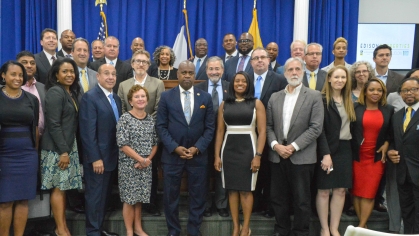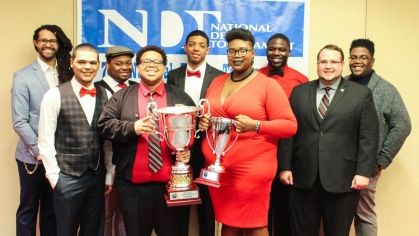Three Decades of Success: R-N's Minority Biomedical Research Support Program
"It has been extremely rewarding to play an integral role in a program that has been a catalyst in transforming negative attitudes toward underrepresented minority doctoral students and their ability to succeed as scientists in the behavioral and/or biomedical research field," comments Barry Komisaruk when asked why the Minority Biomedical Research Support (MBRS) Program is so special to him.
Komisaruk, associate dean of the Graduate School - Newark and Rutgers University Board of Governors Distinguished Service Professor of Psychology, is the founder and director of the MBRS Program at Rutgers-Newark, which he established in 1984 to aid the advancement of students of African-American, Hispanic, and Native-American descent in the biomedical sciences. To date, more than 150 students have graduated from the program, and some are employed by such prestigious institutions as Yale University, Harvard University, the University of Puerto Rico, Albert Einstein College of Medicine, Rockefeller University, the National Institute of Health (NIH), the Mayo Clinic, and Rutgers-Newark. Assistant Professor Alex Rodriguez of R-N's Department of Biological Sciences is the first alumnus of the program to receive a Rutgers-Newark faculty appointment.
Funded primarily by the National Institute of General Medical Sciences of the NIH, the MBRS Program provides financial support to 10 doctoral students (usually juniors and seniors) matriculated fulltime in one of R-N's behavioral/biomedical-related departments: biological sciences, chemistry, molecular/behavioral neuroscience, physics, psychology, nursing, and environmental science. In July 2011, the MRBS Program received more than $3.1 million from the NIH for five years of funding. From the NIH grant each doctoral student in the MRBS Program receives (for a two-year period) an annual salary of $28,456, full tuition remission, a $1,000 research allowance, and defrayment of all expenses associated with attending one scientific conference annually. (R-N sponsors the balance of each doctoral student's financial needs.) For each undergraduate student, the NIH award covers an annual salary of $7,134 for a 15-hour work week.
To be considered for the MBRS Program students must have a minimum grade point average of 3.0 and demonstrate a commitment to pursuing a career in a behavioral and/or biomedical research-related field. Interested individuals should contact Wendy Birbano, coordinator of the MRBS Program, at wbirbano@newark.rutgers.edu


